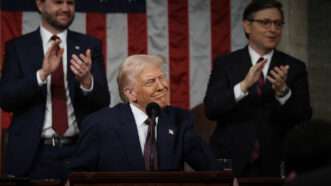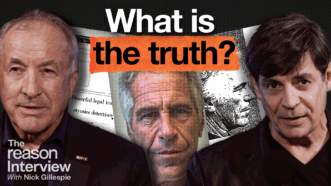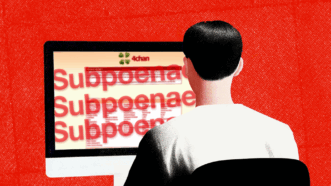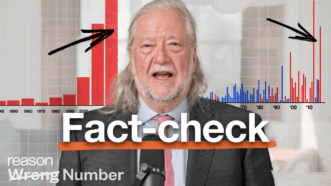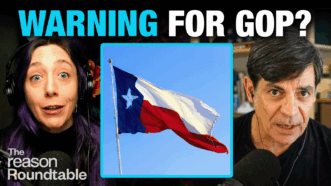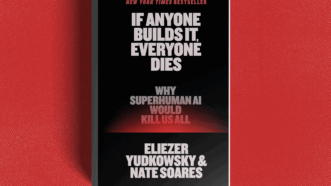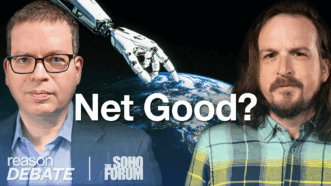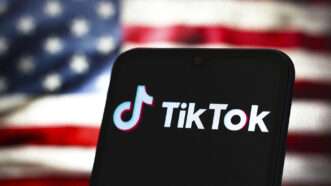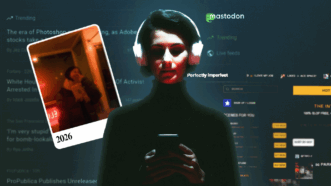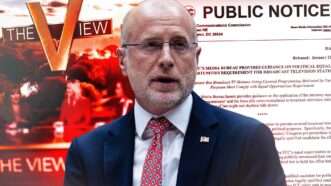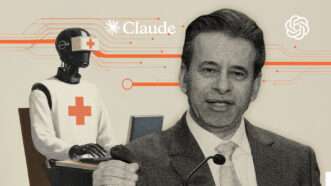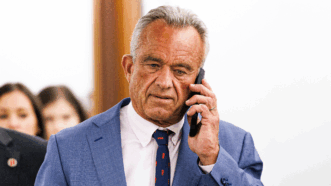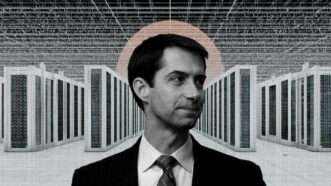Science & Technology
Pentagon to Anthropic: If You Won't Let Us Use Your AI for Mass Surveillance or Autonomous Weapons, Expect Punishment
Pete Hegseth has threatened to invoke the Defense Production Act to force Anthropic to come around.
Politicians Consider Soviet-Style Controls on 3D Printers
Panic over guns drives government officials to propose restricting popular technology.
Trump Says Tech Companies Should Build Their Own Power Plants for AI Data Centers
The plan recognizes that public opinion is what's holding data centers back the most.
Trump Replaces Old Illegal Tariffs With New Illegal Tariffs
Plus: The U.S. could be going to war with Iran, the 2026 Winter Olympic Games, and why AI surveillance is worrying civil libertarians
The Government Wants Your Posts Before It Grants You Papers
The Trump administration will start collecting social media account information on immigration forms.
Weekend With Bernie
Plus: U.S. Olympic hockey team wins the gold medal and Mexico kills cartel boss "El Mencho."
How the Epstein Files Became the Ultimate Conspiracy Theory
Michael Shermer examines the psychology behind pattern seeking, the limits of suspicion, and how the Epstein files fuel conspiracy thinking.
The Epstein Files Obsessives Keep Lying About Their Critics
Tara Palmeri insinuated that Michael Tracey disagrees with her because he's paid by Epstein associates. That's a lie.
Was It a Coincidental Traffic Stop or AI-Powered Surveillance?
When former LSD kingpin Seth Ferranti was pulled over in Nebraska, police claimed a traffic violation.
DHS Wants To Unmask Online Critics
Plus: The FCC targets Disney and Comcast, new Epstein associates revealed, and Trump’s tariffs cause growing rifts with U.S. allies.
In Mamdani's War on Delivery Apps, New Yorkers Are the Collateral Damage
New York City's own past policies are to blame for much of the gig economy drama, which Mayor Mamdani will further exacerbate.
Trump's FTC Chairman Sends a Threatening Letter to Apple for Not Promoting Enough Conservative Media
Chairman Andrew Ferguson continues the Federal Trade Commission’s crusade against free speech with an official letter to Apple CEO Tim Cook.
Ring Drops Controversial Partner After Super Bowl Ad Backlash
The move is a rare win for privacy, both for users and their neighbors.
Epstein Files Fuel Online Outrage at Figures With No Criminal Allegations
"My wife and I have received many threatening and malicious emails, texts, and voicemails the past several days."
Epstein Files: FBI Tracked Down Anonymous 4chan Conspiracy Theorist
The Department of Justice released subpoenas for personal information on two anonymous commenters claiming to have inside knowledge about Jeffrey Epstein's death.
Spain Wants To Ban Social Media for Kids. It Won't Work.
Australia’s experience shows what happens when governments play online parent
The Trump Administration Plans To Repeal EPA Finding That Greenhouse Gas Emissions 'Threaten' Public Health
The EPA under the Obama and Biden administrations invoked that finding to adopt strict and costly regulations aiming to reduce emissions.
Ring's Lost Dog Finder Is a Potential Civil Liberties Nightmare
Search Party uses AI to detect lost pets, but some worry about the Ring program's potential use by law enforcement.
Can This AI Predict How You Will Die?
Delphi-2M was trained on the world's most comprehensive biomedical database with health information from over 400,000 people.
A First Amendment Lawsuit Challenges FTC Chairman Andrew Ferguson's Vendetta Against NewsGuard
The commission has targeted the news rating company with onerous record demands and a merger condition aimed at cutting off its revenue.
A 'Goldilocks' Effect for Online Teens? Moderate Social Media Users Fare Better Than Abstainers or Heavy Users
“Both abstinence and excessive use can be problematic,” researchers suggest.
Judge Lets Blade Runner 2049 Copyright Suit Against Elon Musk and Tesla Move Forward
The ruling makes it less likely for copyright suits involving generative AI to be dismissed, discouraging use of the technology with the specter of costly legal fees.
These Climate Change Charts Are Scary. They're Also Wrong.
The job of scientists isn't to manufacture alarm. It's to communicate the truth.
Next-Generation Nuclear Power Can Meet Data Center Energy Demand—If Regulations Allow It
Is this small modular nuclear power’s moment?
How To Speed Up the Search for Cures Through a Change in Probability Theory
It seems likely the FDA would do well to accept more Bayesian reasoning in medical research.
Democrats Are Flipping Trump Districts in Texas?
Plus: a partial shutdown over ICE funding, Kevin Warsh to lead the Fed, and Moltbook’s AI society
No, AI Isn't Plotting Humanity's Downfall on Moltbook
Viral posts about devious chatbots on a robot Reddit haven't held up under scrutiny.
Superintelligent AI Is Not Coming To Kill You
If Anyone Builds It, Everyone Dies is an extreme proposal to effectively outlaw promising AI progress.
How Americans Are Fighting a British Censorship Invasion
A new bill in Wyoming aims to defend Americans against the U.K.’s online regulators.
Will AI Benefit Everyone?
A Soho Forum debate on artificial intelligence's potential to deliver widespread societal benefits
Group Chats About ICE Whereabouts Are Protected Speech. The FBI Is Investigating Anyway.
FBI Director Kash Patel pays lip service to the First and Second Amendments while casting suspicion on people who exercise their First or Second Amendment rights.
TikTok Users Say They're Being Censored After New Owners Were Announced. The Company Says It's a Tech Issue.
Here's why I believe TikTok.
Landmark Social Media Addiction Trial Starts Today in California
In the first social media addiction case to reach a jury, K.G.M. claims TikTok, YouTube, and other platforms are responsible for her depression, anxiety, and poor self esteem.
Your Wi-Fi Router Was Probably Made in China. Does That Mean It's a National Security Threat?
The Trump administration is reportedly moving to ban TP-Link routers, but experts say they're no less secure than other devices.
How To Build Your Own Internet in 2026
AI slop and enshittification are making the public social commons unbearable. The alternative pathways are more accessible than you think.
The FCC Wants To Police How Many Conservatives Appear on The View
The equal-time rule is an antiquated regulation that becomes more obsolete with each passing year.
Review: A Hit Country Song Made by AI
Should it matter whether a song was made by a human or a machine?
The FDA's Hands-Off Approach to Medical AI Is a Win for Health-Conscious Consumers
AI-powered medical wearables and software are flourishing following the FDA’s new regulatory guidance.
Rand Paul Turns Against Section 230, Citing YouTube Video Accusing Him of Taking Money From Maduro
After Google refused to take down a video of him, the Kentucky senator suggested upending the legal framework undergirding the internet for three decades.
The Great Zoning Crackdown on Data Centers
Plus: The Trump administration wants to roll back "disparate impact" regulations, New York Gov. Kathy Hochul wants to roll back environmental review regulations, and L.A. waives fees for wildfire rebuilds.
Trump's 25 Percent Tariff on Chip Imports Is Really an Export Tax
The order imposes duties on China-bound AI chips if chipmakers don't invest in American semiconductor fabrication.
This 1996 Law Protects Free Speech Online. Does It Apply to AI Too?
Excluding generative AI from Section 230 could stymie innovation and cut off consumers from useful tools.
Do Cellphones Cause Cancer? RFK Jr.'s HHS Is Suppressing FDA Data Confirming Cellphone Safety.
The Department of Health and Human Services is launching a study apparently trying to find otherwise.
Fix the AI Electricity 'Crisis' by Unleashing Market Forces
The AI boom is showing the limits of our regulated monopoly model for generating electricity.
Data Centers Use Lots of Electricity. This Bill Would Let Them Go Off the Grid.
The DATA Act, introduced by Sen. Tom Cotton, would exempt electrical utilities from federal regulation if they don't touch the electrical grid.



